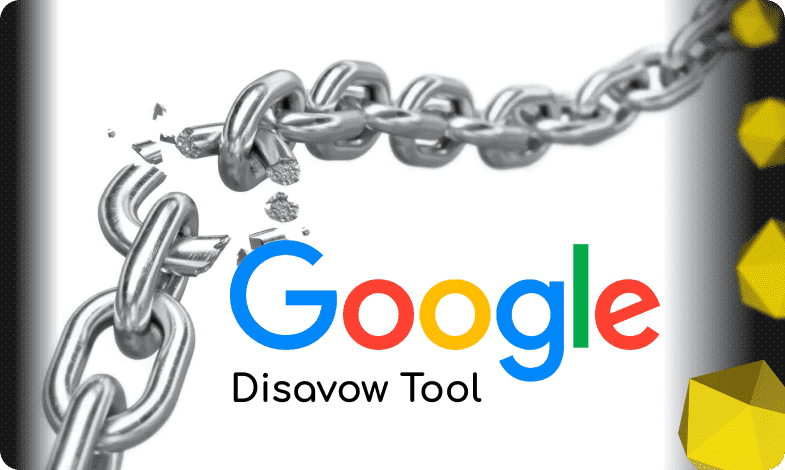Content of the article
- /01 What is a Google Search update?
- /02 Why does Google release updates?
- /03 How to track new updates?
- /04 Features of Google updates
- /05 Main types of updates
- /06 Key updates of the last year
- /07 How do you know if an update has affected your website?
- /08 How to respond to the negative impact of the update?
- /09 Conclusions

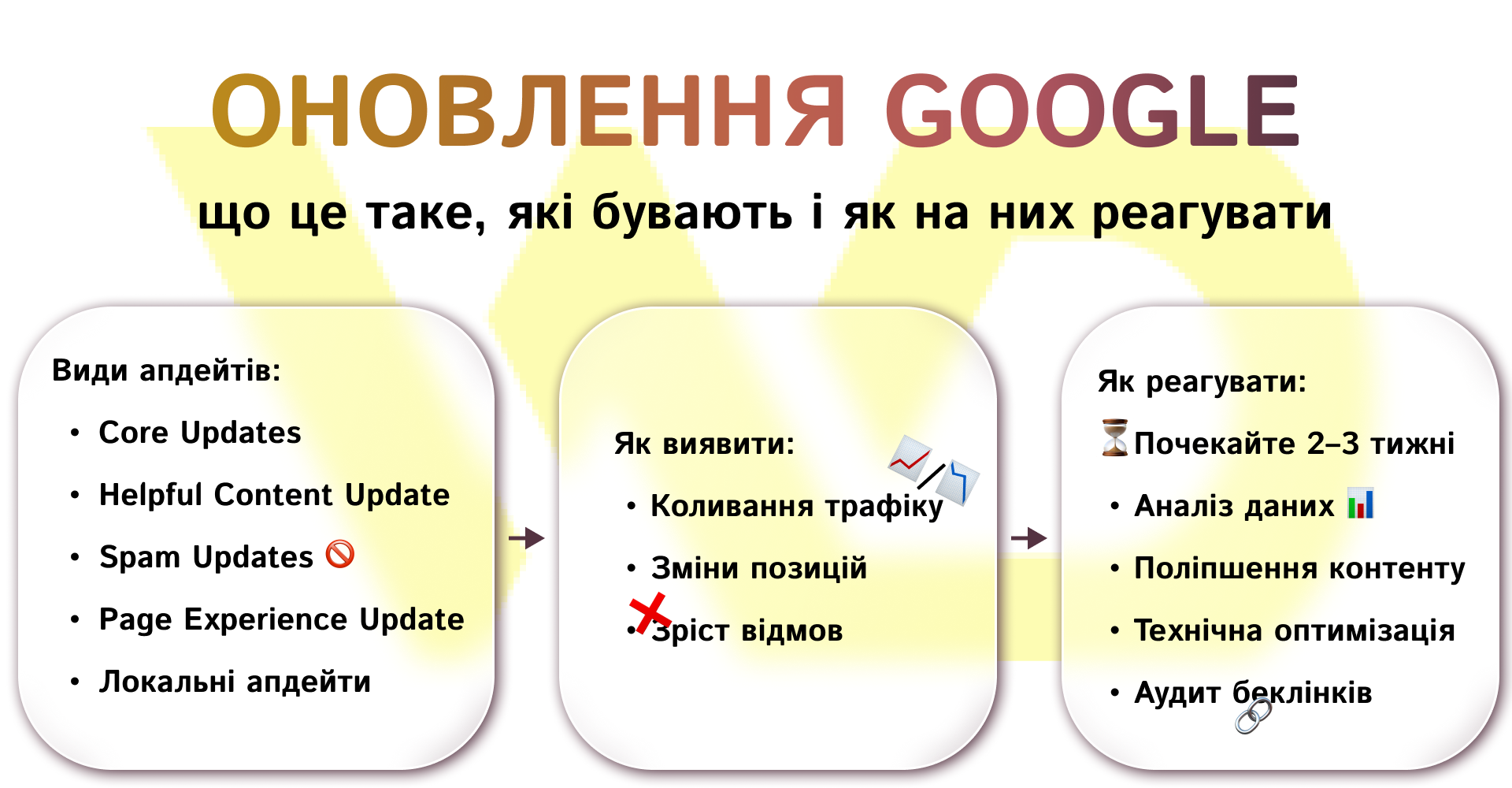
Every Google update means changes in search algorithms that can affect the visibility of your website. Sometimes these are minor tweaks, sometimes they are large-scale Core Updates that reconfigure the ranking principles. We’ll tell you about the main types of updates, explain why Google releases them, and show you what steps to take to quickly adapt and maintain or improve your search rankings.
What is a Google Search update?
According to official data, Google’s update is another update to its ranking algorithms and search tools, which the company releases to improve the quality of results and combat low-quality content. Updates are always aimed at improving the relevance of the results and user safety.
Why does Google release updates?
The search ecosystem is evolving rapidly, and Google strives to stay one step ahead of changes on the Internet. New updates help to adapt to these changes and provide users with the best search experience. Let’s take a look at the main motives of the search engine.
- Improving the relevance and quality of results.
Core Updates checks and re-evaluates all websites to ensure that the maximum amount of useful and reliable content is displayed in search results. This helps Google maintain its mission of providing results that are relevant to the user’s intent.
- Fighting spam.
Specialized Spam Updates weed out sites with low-quality or manipulative links, lowering their rankings. This reduces the number of fake or unwanted results in the SERP.
- Adaptation to changes in user behavior.
With the development of voice search, mobile devices, and AI queries, Google is revising its ranking criteria to ensure that results reflect new formats and technologies. This ensures the convenience and speed of search on any device.
- Improving user security.
Algorithm updates detect and block phishing sites and malware, protecting people from cyberattacks. In this way, Google minimizes the risks of clicking on links in the SERPs, as described in Google Help.
- Ensuring a level playing field for all resources.
Artificial lists and «tails» of a big brand can reign supreme without updates. Updates equalize the rules for small and large sites, allowing quality content to reach the top regardless of budget.
- Optimize user experience and support new content formats.
According to Google for Developers, the Page Experience Update takes into account Core Web Vitals, loading speed and mobile responsiveness, as well as the integration of interactive results and AI reviews. This creates a more pleasant and productive path to information for users.
«When people look at search results, they sometimes see something completely new. We’re not making these changes to make life harder for webmasters, but because we see the high expectations of users and want to make sure that we can meet them tomorrow.» – John Mueller, Google Search Central Live NYC (March 29, 2025), Search Engine Journal
How to track new updates?
Google’s search algorithms are updated almost every day, and it’s important to be aware of all the changes in time. Here’s a list of places to look for official announcements and how to get instant notifications.
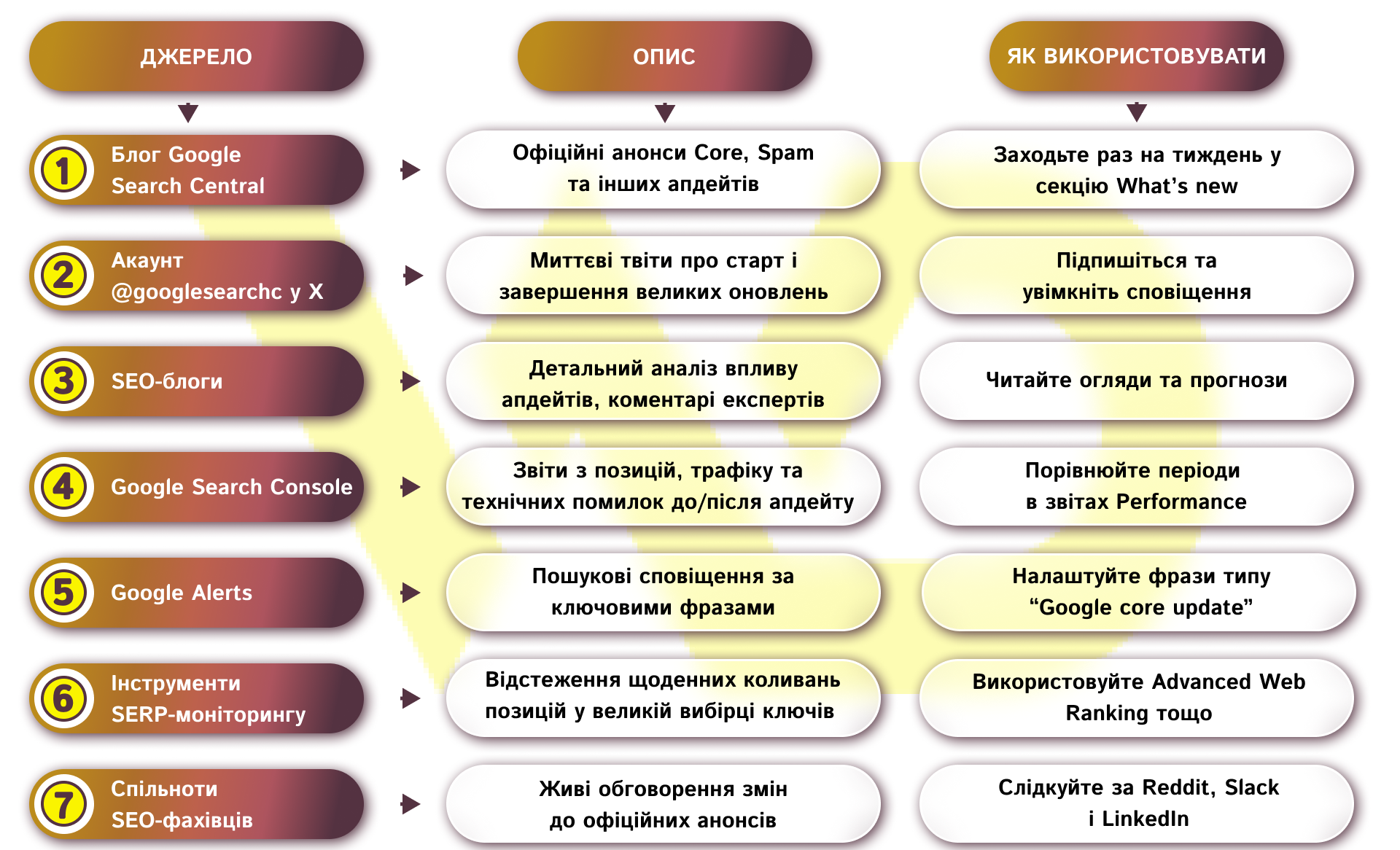
The blog on the Google for Developers website publishes confirmed Core Updates, Spam Updates, and other important changes with detailed descriptions, release dates, and recommendations for webmasters. The What’s new card contains all the latest documentation and algorithm updates, so you just need to visit it once a week to keep up to date.
- Google Search Central’s official account on X (formerly Twitter).
@googlesearchc promptly announces the launch and completion of major updates, posts short instructions and links to detailed materials. By subscribing and enabling notifications, you’ll instantly learn about unplanned changes and important optimization tips.
- Professional SEO blogs and resources.
Platforms such as Search Engine Land regularly publish reviews of each update, analyze the impact on websites, and make predictions for the future.Search Engine Journal and Search Engine Roundtable publish both official announcements and comments from leading SEO market experts.
- Google Search Console.
After the update is released, you should track changes in positions and traffic directly in the Search Console. The Google for Developers tool allows you to compare the periods before and after the update and identify technical errors on your pages.
- Google Alerts.
Set up notifications for key phrases such as «Google algorithm update», «Google core update», etc. and receive announcements from all open Internet sources by email.
- Tools for monitoring SERP volatility.
Services such as Advanced Web Ranking track daily fluctuations in the positions of a large sample of keywords and help you compare them with the dates of updates.
- Communities and forums of SEO specialists.
SEO communities on Reddit, Slack channels, and LinkedIn professional groups often discuss hot changes even before official communications. This allows you to prepare in advance and cautiously test hypotheses about the impact of updates.
After implementing the update, you shouldn’t immediately rush to radical changes: start by observing the data, then analyze in detail which pages or queries are affected, and only then develop an action plan. This way, your decisions will be informed and the risk of mistakes will be minimal.
Features of Google updates
Some changes are almost imperceptible, while others turn search results upside down. Let’s analyze which UX indicators are evaluated by algorithms and how it affects your website.
Frequency and scale
According to an article in ROI Revolution, Google makes an average of 9 changes to its algorithms every day, from small patches that you won’t even notice to major Core Updates that come out every few months and radically change the balance of power in the SERPs.
Focus on UX
Google is increasingly paying attention to user experience.
- Page Experience Update has implemented Core Web Vitals (LCP, FID, CLS) and measures not only loading speed but also the stability of elements on the page – sites with high scores get an advantage in rankings.
- By speeding up the loading of mobile pages, Google recorded a 20% reduction in the bounce rate from search results, which confirms the importance of focusing on user experience.
Improving content evaluation (E-A-T / E-E-A-T)
Algorithms are constantly improving the criteria of expertise, credibility, and reliability:
- Helpful Content Update filters out automatically generated or low-quality texts, increasing the weight of «people-first» content.
- In 2024, Google added another «E» to E-A-T – Everyday Expertise, which allowed it to evaluate the practical knowledge of authors in everyday topics.
Local updates
Local search results have their own peculiarities:
- Google Business Profile Updates may change the rules for displaying contacts, reviews, and tips in Local Pack. For example, starting in October 2024, you will need to verify your profile to run Local Services Ads – otherwise, ads will not be displayed.
- A new experimental tool, Ask for Me, automatically calls local businesses and asks about service availability using Duplex technology – another example of how Google is offering an interactive local search experience.
- The basic tips for improving local rankings remain in the Google Business Profile: current business hours, accurate address, and regular updates.
Each of these areas of change helps Google to remain adaptive and modern, and helps users to develop flexible SEO strategies that take into account both small daily updates and large algorithmic changes.
Main types of updates
So, what should you pay attention to in order to prepare your website for algorithm changes?
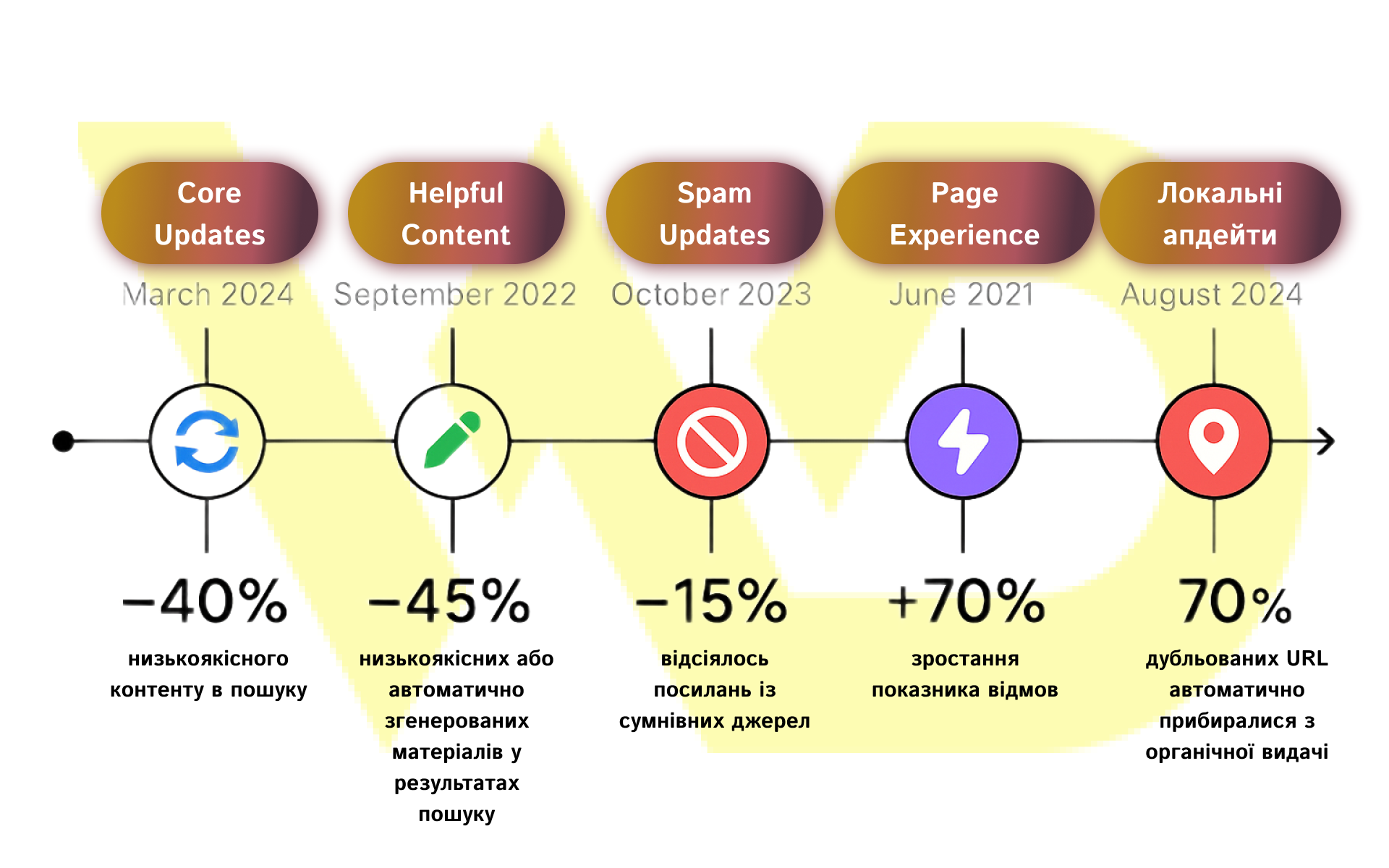
- Core Updates.
Core Updates are large-scale updates to the algorithm’s «core» that simultaneously revise all ranking signals and can significantly change the positions of websites in the search results. For example, in March 2024, Google combined Helpful Content with the March 2024 Core Update, which resulted in an average 40% reduction in low-quality content in search.
To prepare for the Core Update, analyze fluctuations in organic traffic, evaluate the depth and expertise of your content, and follow official announcements.
- Helpful Content Update.
The Helpful Content Update is aimed at weeding out pages that are created primarily for SEO rather than for people. Since the update implemented was in 2022, the number of low-quality or automatically generated content in search results has decreased by 45%.
If your site has lost visibility, check whether the materials really answer users’ questions, contain original ideas and confirmed facts, and not just general advice.
- Spam Updates.
Spam Updates fight against low-quality links and black hat methods of promotion. In 2024, Google released several such updates, which reduced the effectiveness of link-buying schemes on unpopular websites and content networks by 15%.
To avoid penalties, regularly check your backlinks through Google Search Console and services like Ahrefs or SEMrush, and remove or disavow questionable links.
- Page Experience Update.
Page Experience Update measures Core Web Vitals (LCP, FID/INP, CLS), mobile friendliness, secure connection, and the absence of intrusive ads. Since its launch, many e-commerce sites have seen bounce rates increase by up to 70% due to slow loading and unstable layout.
Use PageSpeed Insights, Lighthouse, and the Core Web Vitals report in the Search Console to identify and fix performance issues in a timely manner.
- Local and industry-specific updates
Local updates affect the results of Local Pack and Google Business Profile. In August 2024, various updates began, which removed about 70% of duplicate URLs from organic results if they were already present in the Local Pack. Industry-specific updates (for example, for recipe cards or job listings) often require correct Schema.org markup and detailed information (cooking time, ingredient composition, etc.).
For local SEO, verify your Google Business profile, regularly update your business hours, respond to reviews, and post up-to-date photos.
Thus, keeping track of release dates and understanding the key differences between updates will help you adjust the content and technical settings of your website in time, while maintaining the stability of traffic and search engine rankings.
Key updates of the last year
Over the past year, Google has released several key updates, each with its own purpose and bringing specific changes to search results.
March 2025 Core Update
This major update started on March 13, 2025 and ended on March 27, 2025, covering two weeks of gradual implementation. The focus is on new content quality signals, including enhanced AI Overviews that automatically collect information on topics in the entertainment, dining, and travel sectors. According to an article by Overdrive Interactive, after the update, many websites with in-depth, original content recorded an increase in traffic. At the same time, owners of resources with generic «SEO-oriented» articles experienced small losses.
November 2024 Helpful Content Update
Announced on November 11, 2024, this update lasted until December 5, 2024, and was aimed at weeding out low-quality content created mainly for SEO. The effect was noticeable: sites with in-depth analytical materials, interviews with experts, and unique case studies improved their positions. Instead, resources with automatically generated texts faced a drop in visibility. For content owners and editors, this was a signal to pay more attention to the reliability of the data and add author’s comments or practitioners’ experience.
August 2024 Core Update
Launched on August 15, 2024, and completed on September 3, 2024, this update had a similar goal to previous Core Updates – to improve the quality of results by favoring sites with truly useful content. One of the effects was a decrease in the ranking of pages that relied on superficial advice and general selections, while resources with exclusive research and practical guides received a boost in ranking. Marketers noted that after the update, it is useful to revise the structure of materials, add internal links, and optimize headlines to clearly cover the topic.
May & June 2024 Spam Updates
May 2024 Spam Update was launched in the first half of May and lasted for about a week, blocking sites with a large number of low-quality or paid links more strictly.
The June 2024 Spam Update launched on June 20, 2024 and ended on June 27, 2024, banning farm link buying schemes and automated SEO manipulations.
After these updates, experts recommended conducting a backlink audit, removing or disavowing questionable links, and focusing on getting natural mentions from reputable sites.
Each of these updates shows that Google is constantly improving its algorithms to provide users with only the most useful, reliable, and safe content.
How do you know if an update has affected your website?
Algorithmic changes are introduced gradually – from a few days to a month – so jumping to conclusions can lead to errors. First, pay attention to three key signals.
- Fluctuations in organic traffic.
The simplest indicator is a sudden increase or decrease in visits from search. For example, if last week you were receiving 1,000 sessions per day consistently, and after the update, there were 700 or 1,300, this is a reason to check the impact of the algorithm. In Google Analytics, compare the «before» and «after» periods, paying special attention to the pages with the biggest deviations.
- Changing positions in the search results.
If important keywords suddenly drop out of the top 10 or rise to unusually high positions without any visible changes to the site, the update has most likely been triggered. Open the Performance report in Search Console, filter by the date the update started, and see which pages have experienced the biggest fluctuations in rankings.
- Increase bounce rates and reduce time on page.
If users don’t find the information they’re looking for, they quickly return to search, which increases the bounce rate and decreases the average session duration. To check if the changes are caused by the update, check the Core Web Vitals report in Search Console: compare LCP, FID/INP, and CLS before and after the update.
Remember: slow and systematic data analysis will help you understand exactly whether your website has been affected by the update and prepare for further actions.
Has your website dropped in Google rankings after an update?
Don't guess — take action! A SEO audit from WEDEX will help you understand what exactly has changed, which pages have been affected, and how to restore your rankings. Get clear analytics and effective solutions to bring your traffic back.
How to respond to the negative impact of the update?
If the update has really affected your site, first wait 2-3 weeks – often the algorithm «settles down» on its own. Then, in Google Analytics and Search Console, compare traffic and the «before» and «after» positions to understand which pages are affected. Improve your content: add expert opinions, a clear structure, and authoritative sources. Check the technical parameters (Core Web Vitals, mobile adaptation, HTTPS) and fix the problem areas. Finally, audit backlinks, remove questionable links, and focus on building authority organically.
An integrated, step-by-step approach – from patient waiting to detailed data analysis and gradual improvements – will help not only restore positions after the update, but also lay a solid foundation for further growth in search results.
Conclusions
Search results continue to change dynamically: major Core Updates and daily minor changes require SEOs to be constantly ready to adapt. Algorithm updates are designed to increase the relevance and reliability of results, protect users from spam and abuse, and at the same time take into account new content formats, from voice search to AI reviews. Success depends on the ability to quickly track changes in Google Analytics and Search Console, analyze traffic and ranking fluctuations, and make timely adjustments to content, technical parameters of the site, and link building strategy. It’s important not to take every update as a threat, but rather see it as a chance to improve the user experience, strengthen the expertise of the materials, and build audience trust. After all, it is precisely such resources that steadily grow in search results with any changes in the algorithm.



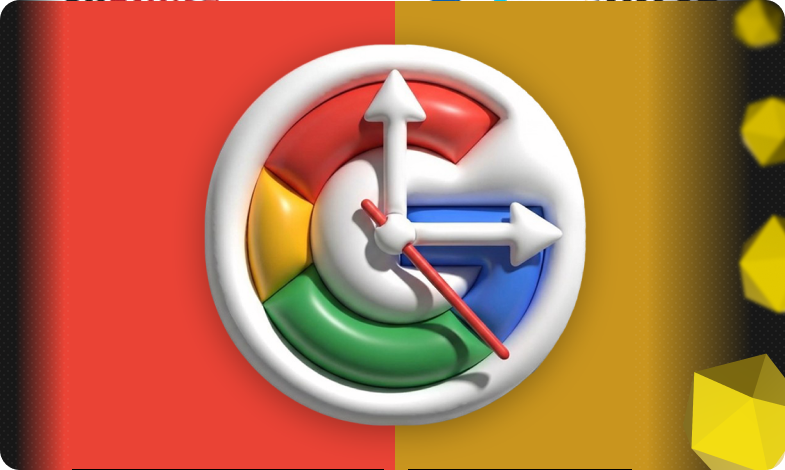


 19/06/2025
19/06/2025  2091
2091


